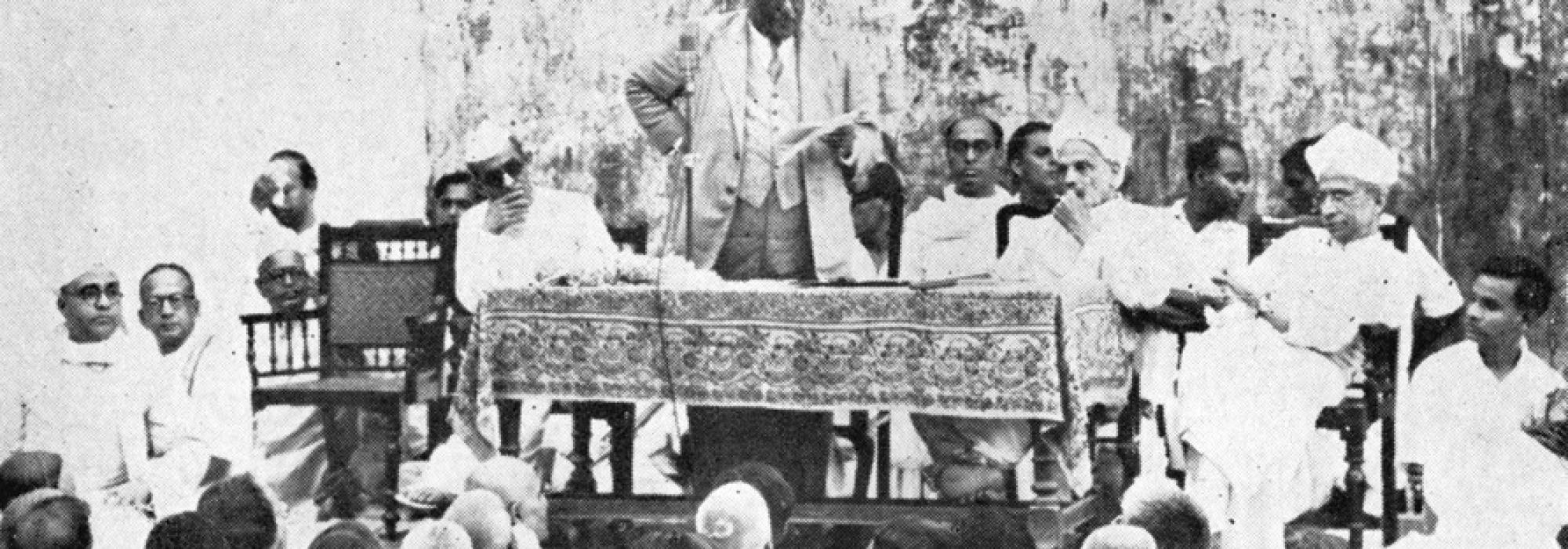Beauty in his Words
Even if a minor grammatical mistake in the English language fell on Sastri’s ears, he would react as though he was gravely wounded on his body. He was very particular about the right pronunciation of English words too. Suppose an English word has two to three syllables, there is going to be a stress on one of those and this is called accent. Sastri was always particular about getting the accents right.
Once, the Town Hall of London felicitated Sastri. It was a very large gathering. Several prominent people attended the banquet. The Lord Mayor of London gave a speech appreciating Sastri’s works. Sastri then delivered his vote of gratitude for the felicitation. Upon hearing him speak, Lord Simon, who was in the audience turned towards his secretary Mr. Bach and remarked – “Mr. Bach! I didn’t know that our language was so beautiful. How mellifluous!”
I got to know of this incident from Mr. Bach.
Kāvyavācana – Rendering of Poems
One evening, I met Sastri and his friends at S.G. Shastri’s house. During our conversations, we happened to pick up the topic of teaching English literature. As we continued exchanging thoughts on the subject, our conversation turned towards poetry. We spoke about Wordsworth’s anthology of poems and I remember Sastri reciting a couple of short poems from the collection. He stressed upon every syllable in the poem and as the Rāmāyaṇa says, it was ‘Avilambitam-adrutam’ (Neither too slow nor too fast). He modulated his voice to suit the emotion captured in the poems and rendered it such that the meaning was immediately evident to the listener. This was a lesson of sorts for us. I cannot claim that I learnt the lesson in its entirety.
When Sastri was a lecturer at the Hindu High School in Madras, a famous literary scholar by name Mark Hunter happened to visit the place. He was well versed in aesthetic recitation of English verses and in enacting Shakespearean plays. Sastri was trained under him. D. Venkataramayya, who rose to be the Deputy Director of the Education Sector later in his life, happened to get tutored by Mark Hunter along with Srinivasa Sastri. Both Sastri and Venktaramayya were pursuing their L.T (Licentiate Teacher) degrees back then. Their friendship which started at this instance blossomed into an immortal one.
K. Ramachandra Rao was another person who had close association with Srinivasa Sastri due to his love for English literature.
The System of Teacher-Manager in Schools
Srinivasa Sastri came to light for the first time because of the interest he had shown in the developmental activities of the Hindu High School located in Tiruvallikkeni of Madras. He was serving his tenure as its chairperson back then. Before moving to Madras, he had worked as a lecturer at schools in Mayavara, Kumbhakonam and a few other places. He had described to me the sorry state of the educational institutions during those days. The system of Teacher-Manager was common. The schools which had this system were not government schools, but were those which received a meagre grant from the government from time to time. It was the manager's responsibility to take care of all aspects of administration. The manager, was, in a sense, the head of the school. The teachers he had appointed were his servants. These servants and the manager rubbed rough edges with each other in connection with the salary, leaves, time table and mostly in matters realated to promoting students from one year to the next. The teachers were of the opinion that a student had to be promoted based on his scores in the examinations. The manager, on the other hand, preferred to promote the wards of wealthy men of the city, government officials and those in the town who were near and dear to him. Many schools shut down due to such disputes.
Schools with the Teacher-Manager system were introduced as remedy to the existing situation. In this new system, the manager also had to be a teacher. Thus, he was the Head Master too. The problems that existed before now manifested itself under three different heads
- The role of the manager to be carried out by the Head Master
- His Head Master-hood
- The team of the other teachers
Kottukkaaru Panju (Kottukāru Pañju)
This misadministration had gone so far that in a school located in Mayavara or a place close-by, teachers had not been paid their salary for a very long time. They raised their voices against the management and conveyed their agonies to the Manager-Head Master. They threatened him. He wouldn’t budge a bit.
Finding no solution to the problem, the teachers sought refuge in a person called Panju, who was the chief of the men who ferried corpses. His full name was Kottukkaaru Panju. He was a contractor who carried dead bodies. Kottukkaaru Panju was well-built and he had about ten men with him who resembled him in their built. Panju found that the agony of the teachers was well placed and he wanted to help them get justice. He promised “I will help you get your salaries. Leave this matter to me.” With these words, he went to the school with his group of men. Panju and his men surrounded the Manager-Head Master and roared at him. An alarmed and frightened Head Master immediately gave in. He said – “I will give you whatever you want!”. Panju said –“You should vacate the place immediately. If not, we will make you leave. I am going to be the Head Master starting today”.
While this gave some courage to the teachers of the school, some of them were scared to work under Panju. There was a hearing at the Panchayat held and the school later got a new administration.
After narrating this story in detail to me, Sastri said “This was the kind of trouble I had to face back then. Such was the sorry state of our schools when I joined as a teacher”
A Conflict in Bangalore
During his days in Bangalore, Sastri encountered an incident similar to that associated with Kottukkaaru Panju. A certain high school in Bangalore was under the management of a rich man, who happened to be generous and graceful in his manners. He, however, often fell into the obligation of his friends. One of his friends held a post as an important officer in the government. His children studied in the school run by this rich man. The two belonged to two different classes. Even after having spent two to three years in the same class, they did not get promoted. Their parents wanted to somehow have their wards promoted to higher classes. The teachers at the school were of the opinion that the students were not smart at studies and were not interested in attending school. The teachers even displayed the answe rscripts submitted by the students to attest their statement about their dullness. This dispute gained heat and the rich owner of the school threatened the teachers that he would remove them from their jobs. The teachers, who were thus frightened approached Srinivasa Sastri for help.
Srinivasa Sastri picked up the answer scripts of the two students and went to Mr. Maclver (ICS), who was a Cantonment Collector back then. He described the situation to him. Maclver was a reliable person and had great respect for education. Moreover, he was one of the members of the Governing Council of the school. As per his advice, the interest of the teachers was protected in this particular case. The rich owner of the school was also relived as the problem got solved in an amicable manner.
To be continued...
This is the fifth part of the English translation of Second essay in D V Gundappa’s magnum-opus Jnapakachitrashaale (Volume 6) – Halavaru Saarvajanikaru.















































